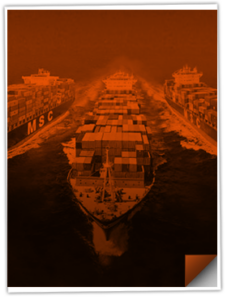Featured Headlines:
Time for Some Section 301 Refund Fun
FDA Publishes Import Process Video
Biden Springs Additional Sanctions on Russia
Burlington Northern Service Heads South
Time for Some Section 301 Refund Fun
- US Customs and Border Protection (CBP) officials announced that the Automated Broker Interface (ABI) in the Automated Commercial Environment (ACE) has been updated to accept the recently reinstated product exclusions for previously expired Section 301 duties as of April 12, 2022.
- Importers interested in applying for product exclusions can submit retroactive claims for applicable entries that were filed on or after October 12, 2021.
- Click here to view the full Federal Register notice (2022-06397)— which includes the full list of excluded products.
ITC Jolted by Battery Charges
- The US International Trade Commission (ITC) is asking for input regarding an ongoing Section 337 case related to imported batteries and the products which contain them; according to court documents, the plaintiffs have requested a general exclusion for 13 Chinese firms that allegedly infringed upon design patents.
- Written submissions must be filed by April 15, 2022.
- Click here to view the Federal Register notice.
FDA Publishes Import Process Video
- Did you know that the Food and Drug Administration (FDA)— the organization responsible for regulating foods and drugs for people and animals, biologics (including vaccines), medical devices, dietary supplements, cosmetics, radiation emitting products, and tobacco products in the US— recently produced a new public video to bridge the gap between foreign suppliers and domestic importers/brokers?
- The video outlines the general import process for FDA regulated products and is divided into five different phases—Preparing to Import (2:12), Entry Submission (2:58), Entry Review (4:54), Examination and Sampling (7:18), and Compliance Review (8:33).
- Click here to view “Importing FDA-Regulated Products: The Import Process”.
- Click here to view CSMS #51536413.
Biden Springs Additional Sanctions on Russia
- On April 6, 2022, President Biden signed Executive Order 14071, which included additional sanctions and export controls for the Russian Federation by the United States.
- New prohibitions included the following: (i) new investment in the Russian Federation by a United States person, wherever located; (ii) the exportation, reexportation, sale, or supply, directly or indirectly, from the United States, or by a United States person, wherever located, of any category of services as may be determined by the Secretary of the Treasury, in consultation with the Secretary of State, to any person located in the Russian Federation; and (iii) any approval, financing, facilitation, or guarantee by a United States person, wherever located, of a transaction by a foreign person where the 2 transactions by that foreign person would be prohibited by this section if performed by a United States person or within the United States.
- Click here to view the full Federal Register Notice.
- Click here to view the Executive Order.
Burlington Northern Service Heads South
- With intermodal volume up over 6%, Burlington Northern Santa Fe (BNSF) Railroad is looking to hire 1000 workers in Southern California to help support their Los Angeles to Chicago services.
- BNSF has been forced to ground containers at the Joliet ramp in Chicago—which is a clear sign of a chassis shortage.
- The average intermodal wait time is up over 20% since February; even motor carriers using their own chassis face major delays in Chicago as crane operators need to reposition grounded containers onto any available chassis.
- Compounding the bottlenecks, Burlington Northern has struggled to get their rail cars in the best locations for current cargo demand spikes.
Domestic Pit Stop Back Drop
- As international volumes shift from the West Coast to East Coast and Gulf ports, regional trucking spot rates are spiking. While nationwide dry van spot rates have come down by 8%, rates from Texas are up as much as 13 cents per mile on loads routed to Kansas (North), to Florida (East) and/or to South Carolina (East).
- In coordination with the US Department of Labor, the Federal Motor Carrier Safety Administration (FMCSA) has called for applications for a leasing task force to examine the fairness of lease-to-purchase and straight lease agreements. The scope of this evaluation will extend to leasing companies, motor carriers, owner-operators, and drayage drivers.
- The FMCSA probe will explore the possibility of predatory leasing arrangements, evaluate typical truck-lease agreements and terms, and identify parties that are exploiting workers in the trucking industry.
- Spot FTL volumes out of Houston are up almost 30% since February.
- Among the five largest US ports, only Savannah has enough drayage capacity to secure bookings within 3 days. All other larger US ports require 7-10 days’ notice to secure drayage power.
China Zeroes in on Zero COVID
- As Shanghai reports over 20,000 COVID infections per day and Ningbo declares a “yellow alert”, the central Chinese government in Beijing is attempting to exert control by ordering all provincial governments to keep airports, harbors, and highways open and operating efficiently despite anti-pandemic protocols.
- The Ningbo outbreak, albeit currently much smaller than Shanghai’s, is particularly worrisome because Ningbo has served as an alternative to Shanghai for weeks. With warehouses near Ningbo full, and goods from the Shanghai region looking for a new home, any shutdown of Ningbo would be particularly harmful to global supply chains.
- Shanghai officials have classified residential units by three risk categories; experts estimate that less than a third of the city’s population is allowed to move freely, which severely hampers potential manufacturing and transportation in the region.
- As of early April, container dwell times are up 74% compared to January to March 2022.
- Analysts estimate that 45 Chinese cities are implementing full or partial lockdowns—these cities make up 26.4% of the total population of China and a staggering 40.3% of GDP.
- As China’s strict Zero COVID policies limit international flights, China Eastern Airlines has announced a nearly $2 billion loss for 2021.
This Flippin’ Ocean Shippin’
- As many as 1000 seafarers are stranded on 100 vessels as a result of Russia’s bombardment of Ukraine.
- The International Maritime Organization (IMO) and the International Labor Organization (ILO) wrote a joint letter in support of the seafarers requesting “urgent action” from the United Nations, the Red Cross, and Doctors Without Borders.
- Two days after deadly floods struck South Africa, ocean carriers are reporting that there is still no vehicular access to Durban’s container terminals.
Smaller Importers Plea to FTC
- Smaller importers have pushed for a Federal Trade Commission (FTC) supply chain review of the largest 9 American consumer goods suppliers, retailers, and wholesalers, including Amazon and Proctor and Gamble.
- During an FTC hearing late last year, smaller grocers and retailers claimed that larger companies unfairly used their overall scale to monopolize product suppliers and transportation allocations.
- Service contract negotiations in early 2022 only highlight the extreme disadvantages for smaller shippers, who may lack attractive consistent weekly volumes— causing them to pay rates estimated to be 50-100% higher than Wal-Mart, Target, or Home Depot, even when they are offered a Beneficial Cargo Owner (BCO) contract.
- Another obvious difference between The Haves and The Have Nots is that only the largest companies can charter vessels that inject much needed transportation capacity into a given supply chain.
- Similarly, many smaller NVOs have been denied contracts by Maersk and Hamburg Sud (among others) for business that has been loyally tendered to those carriers for a decade or longer. Even when smaller NVOs do get a contract offer, the allocations are either smaller than historical norms and/or the port offerings emphasize base ports only.
- The fate of small to medium importers in today’s market is that they are often offered no contract space at all for less attractive commodities or port pairs. For many of these companies, the international shipping reality threatens to put them out of business entirely.
- As transit reliability diminished greatly by the end of 2020 (it stands at about 10% globally at this point!) and as ocean carriers honor allocation promises with less and less predictability, many smaller shippers stopped signing service contracts in 2021. For many of these companies, the lack of an existing deal is yet another headwind for obtaining reliable and affordable allocations.
- The scale disadvantage continues once goods arrive in the US. Dray companies prefer larger commitments, and the smaller shippers end up in what amounts to a bidding war for whatever trucking capacity remains. Should you lose that bidding war, huge demurrage bills await you in just 4 short days.
- The obvious takeaway is that smaller companies will have to pass all of these extra costs to consumers, which may well make their goods less attractive than their monolithic competitors’ offerings.



